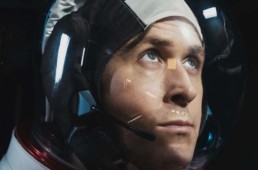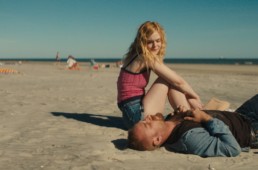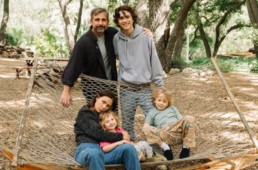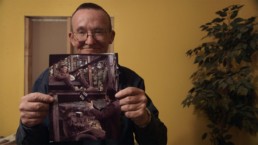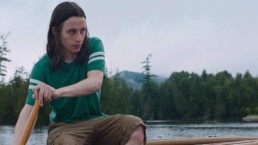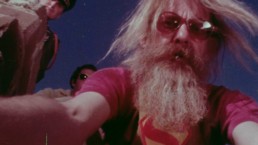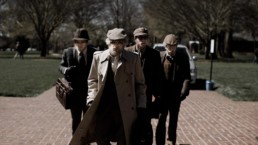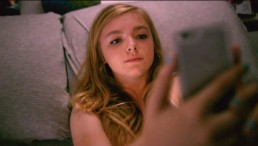'First Man' Review: Sailor of the Stars
"Ah, but a man's reach should exceed his grasp, Or what's a heaven for?" - Robert Browning
The moon, perched high in the sky, sits magisterially and quietly dignified. Like a watchful mother keeping eyes over her children that run around in the backyard of a grown-ups' dinner party, her protecting presence observes all. In director Damien Chazelle's eyes – and as he portrays in his latest film, First Man – this celestial entity is a shared spiritual ancestor to the first man to ever set foot on the moon, Neil Armstrong. Just as silently solemn, we see a man who was a brilliant engineer, loving father, and lonely sailor of the stars.
First Man sets out to be many things. Telling the story of the eight years prior to the famed moon landing – including early tests and unsuccessful trials that weighed heavy on all involved – it's a wonderfully exacted and historically accurate period piece dense with action-adventure elements that are captured with stunning practical effects and visionary camerawork. However, the real survival story that Chazelle focuses on is on the ground where Armstrong navigates the tragedies of life, including the early loss of his youngest child to cancer.
This is where the film's center is- a small character drama grounded not only by gravity but in the realities of life that surround him. It is Chazelle's and screenwriter Josh Singer's (Spotlight, The Post) interest and focus on this smaller side of history that characterizes Armstrong, but also what challenges the film. Armstrong is no space cowboy, but rather an engineer who thinks physics is "neat". To this end, I wish that Chazelle and company would have gotten more swept up into the romance of the cosmos.
With 'First Man', [Damien Chazelle's] third major release, he once again explores a young man's ambitions of greatness and the things he sacrifices to get it.
As this "first man," Ryan Gosling offers his quietly powerful persona to this real-life stoic man of few words, bringing steadfast commitment and beautiful restraint to the role. It's the enigmatic Claire Foy as Janet Armstrong who adds the necessary pulse and life force to the film, putting those "boys" at NASA in check in moments that put her husband in danger. A fantastic supporting cast, including Kyle Chandler, Jason Clarke, Christopher Abbott, and Corey Stoll, round out the film by adding virtuoso performances.
Damien Chazelle has always been a man of ambition. With First Man, his third major release, he once again explores a young man's ambitions of greatness and the things he sacrifices to get it. Chazelle naturally brings the cinema of life to the big screen with clear and incalculable vision. He is, after all, the youngest person ever to win the Best Director Oscar for last year's La La Land. To this end, perhaps First Man's overall effect would be even more impressionable and felt if seen in IMAX. In this setting, the 16mm film transforms into IMAX during the moon sequences, which Chazelle states that was intended to be his "Wizard of Oz moment."
At the end of the day, audiences will either cherish First Man for offering a contemplative inward journey or feel that it held itself too restrained. Overall, I would have liked to feel Armstrong be a little more awestruck, even if this was intentionally absent so as to faithfully show his brilliance as an engineer and devoted father whose still waters ran deep. Nonetheless, First Man is a brilliant work of art and dutiful historical document that no doubt furthers Chazelle's, Gosling's, and the rest of the creative company's artistry, as well as adds to the story of Armstrong and those who dare to find themselves amongst the stars.
141 min. 'First Man' is rated PG-13 for some thematic content involving peril, and brief strong language. Now playing in theaters everywhere.
https://www.youtube.com/watch?v=w4GtJB5WAlQ
'Galveston' Review: The Allure of Life on the Run
Living life on-the-run is a romantic idea, as made popular by the thriller genre.
It's certainly a tried-and-true storyline of the pulp-novel variety. But there's a problem in pulpy-writing: it's the same story, the same familiar tropes, characters and storylines that are recycled over and over. A movie like No Country for Old Men is perhaps the most brilliantly realized version of this country western crime thriller with its artistic sub-text. Or the intelligent character portrayal of the brothers in the recent filmHell or High Water with its great bank-heist story. But beyond these features, a film can be plagued if the story is lacking, as in the new movie Galveston.
Based on the novel by Nic Pizzolatto, the creator of True Detective, Galveston is another entry into the hit-man-on-the-run genre. The film stars Ben Foster as Roy, a murderer-for-hire who becomes the hunted when he's set-up by his boss (Beau Bridges). When the job goes south, he's left with young Raquel, played by Elle Fanning, "Rocky," as she calls herself, who wants to escape a life of selling herself as a call-girl. The relationship could certainly set itself up for a romantic pairing, but Roy's demons, including an ailment that has put an expiration date on his life, leaves Roy emotionally cut-off. Foster and Fanning always bring something special to the big screen and they share a sort of chemistry with the characters that live a bit too on-the-page.
Maybe it’s the reaction to the knowledge that impending doom is so close, so every moment makes us feel alive.
In an interesting move, this is the latest film directed by multi-hyphenate Mélanie Laurent, who audiences will know from such on-screen work as Beginners and Inglorious Basterds. Laurent adds artful introspection to what is the promise of redemption for Raquel and Roy's ever-consuming darkness. What's interesting here is that the French-born actress, singer, pianist, screenwriter, and now director takes on this American genre movie, which perhaps hearkens back to the idea that forging your own destiny against all odds is a particularly American tale.
Ultimately, Galveston's story of living life on the run is an alluring one, and maybe it will always continue to be alluring. Maybe it’s the reaction to the knowledge that impending doom is so close, so every moment makes us feel alive. Or maybe it's because, at some time or another, we all feel that we're running from something that we don't want to confront.
91 min. 'Galveston' is not yet rated. Opening at Laemmle Monica Film Center and VOD on this Friday.
https://www.youtube.com/watch?v=82UWW1bJdl0
'Beautiful Boy' Review: A Son, Astray
It’s a heartbreaking thing to sit helpless watching a loved one struggle with inner turmoil and grief.
And short of that person being oneself or a family member, watching two of the big screen’s most beloved stars – Steve Carell and Timothée Chalamet – play out this heart-wrenching story as father and son, is a not easy to watch without letting your emotions surface.
Carell and Chalamet star in Beautiful Boy, the new film based on the pair of memoirs written by David and Nic Sheff, a father and son whose stories show the painful perspectives of a son’s ongoing struggle with drug addiction. Beautiful Boy depicts David’s desperate determination and Nic’s recurring relapses, revealing there may be no escape from rescuing someone from something as merciless and addictive as harrowing chemical dependencies.
It’s nothing short of expert casting to see these actors inhabit these real-life roles – you might even wish Carell and Chalamet were part of your own family. Few other actors could make you feel as crushed as seeing a heartbroken Steve Carell playing a forlorn father figure. And which other young actors could make you feel as torn up inside as Hollywood’s latest heartthrob, Timothée Chalamet, throwing his promising life away?
There have been other films about the consuming nature of drugs and addiction, and there are familiar notes to Beautiful Boy that don’t exactly differentiate themselves from those other films. But what distinguishes Beautiful Boy, making it so moving and impactful, is its ability to show how addiction affects more than just the drug user, but the user’s larger circle as well. Other stories of addiction might have focused solely on Nic and his journey of substance abuse, but in seeing his father David, meandering around his son’s empty bedroom consumed in thought and worry, we see the fractures from all sides. David calls the police to report his son as a missing person early on but eventually is resigned to accept that Nic’s reliable absence signals that he is no longer missing, but altogether lost.
David and Nic’s stories of recovery, relapse, and the hope for redemption paint a poignant picture of what makes life so beautiful.
What distinguishes Beautiful Boy further is that we see the moments where Nic momentarily recovers, rather than portraying him in a total downward spiral. Short-term stints of sobriety are an honest part of the experience. Nic rides the waves as best he can until he is all but swallowed up by the sea. Seeing a strung-out Nic at the end of the film at his absolute worst stands as one of the most tear-jerking moments I’ve had this year.
There is such heart brought to this adaptation by director Felix van Groeningen. It’s felt in the chemistry of its stars, which also includes Maura Tierney and Amy Ryan as Nic’s worried step-mother and mother (whose contributions in the film are effective but largely underutilized, being a story of father and son grief). The flashbacks of Carell as David with the younger Nic (Kue Lawrence, Jack Dylan Grazer) paint the entire picture of this family’s story even more affecting.
Beautiful Boy is a powerful, heart-wrenching story that offers the most sympathetic portrait of addiction that I’ve seen in recent times. David and Nic’s stories of recovery, relapse, and the hope for redemption paint a poignant picture of what makes life so beautiful.
https://www.youtube.com/watch?v=y23HyopQxEg
'hillbilly' and 'Behind the Curve' Reviews: Fringe Groups Seeking to be Seen
One of the things that bubbled up during the 2016 Presidential campaign and then all but burst afterward was the talk of a deep cultural divide in America.
This divide might be explained by a few things. Minority groups, whose voices had previously not been heard, have risen and social movements have gained nation-wide attention in true democratic fashion ushered in by the digital age. People's stories are being told and shared to the larger masses easier than ever before, both online and in media representation. Being open to hearing other sides of arguments can be an uncomfortable thing. Educational nonetheless. In order to run the country in a civilized and democratic fashion, we should be open to understanding the effects of harmful stereotypes minorities face, and we should be open-minded when we hear people say that the Earth is not round, but flat.
Well, perhaps not the latter.
At this year's LA Film Festival, two documentaries examined people who are trying to be seen as legitimate groups in American society. hillbilly, directed by Sally Rubin and Ashley York, follows the progressive feminist filmmaker York as she returns to her hometown on the eve of the 2016 Presidential election. Here, she examines the harmful stereotype of hillbillies that she and her family and friends have had, and still have, to endure for decades. hillbilly is an example of a social documentary where the filmmaker seeks to re-appropriate the harmful stereotype while showing how the longlasting effects on those ostracized have led to marginalized political voices.

Of course, where a film like hillbilly seeks to actively re-frame harmful stereotypes, the documentary Behind the Curve, directed by Daniel J. Clark, is a light-hearted look at showing the quirkier folks who believe in a flat-earth. Now I wouldn't want to undermine my entire argument that these flat-earthers should be made fun of, but as Clark so deftly shows in his movie, it requires an incredulously naive person to believe these people. Where a conspiracy theory movie could have easily played like a hard-nosed investigative take-down, Behind the Curve is successful because it's more of a curious, almost empathic look at this group of people who are oddballs in their own right. Among a community of fellow weirdos, these flat-earthers feel a sense of rightness and belonging.
Hearing things that go against our natural inclination can be hard. We might feel a personal attack on ourselves, and I'd be lying if I, a young Californian kid whose vote didn't go toward the current President of our country, didn't feel that hillbilly was initially not a sad story, especially compared to the more wronged minority groups that Black Lives Matter or #MeToo have positioned themselves to be. But co-director Ashley York is the perfect person to bring this story to light, being a progressive filmmaker who couldn't be more different than her "MAGA" family. But York proudly identifies as a hillbilly, while simultaneously getting her family to open up to what they see as Coastal elitism devaluing the Appalachian people and their ways of life. It's comical to see the image of the hillbilly in popular culture – straw hat, toothless, and illiterate – but York shows that this ignorant representation also does harm by undermining these people's civil and political rights.
It's not as hard to hear conflicting information presented by Flat-earthers, because – truly, objectively – it's such a funny concept. And the people that make up this community, while distrustful of popular ideas and historical events, have a streak of animation to them. They are show people, proudly defiant of being on the fringe. A spectrum of people differs in terms of what a "flat earth" exactly that means – some believe that the sky is a dome covering, some believe that they're in infinite space that expands upwards, and variations beyond that. These conspiracy theorists even differ with themselves, thinking that some of their own are operatives and undercover. But what Clark does so well is explain how astrophysicists and scientists need to re-position their arguments better so that they don't alienate others on the outside.
Both documentaries are more than educational and worth your time. We need to continue to highlight the stories of people whose stories may differ from our own. Even if we are worlds away... and however flat those worlds may be.
'hillbilly' is not rated. 87 minutes.
'Behind the Curve' is not rated. 96 minutes.
'The Song of Sway Lake' Review: Desires Lie in the Depths of the Lake
Going back in time can be a romantic idea.
Sometimes, it's movies or music that helps us transport back to a more peaceful time. In The Song of Sway Lake, it's a piece of music that gets two young men to go back to an old family house looking for a rare family record- the titular "Song of Sway Lake" which, along with its value, holds family memories and secrets that must also be confronted.
The Song of Sway Lake follows Ollie (Rory Culkin) who brings his Russian vagabond friend Nikolai (Robert Sheehan) to his old family house to help him search through records and photographs for a rare family record they are trying to pawn off. They break into the house and have a general sense of unsupervised fun, but what starts as a private looting turns into a family affair when his grandmother Charlie (Mary Beth Peil) arrives with her caretaker (Elizabeth Peña, in her final film role), who is also there to find the family record. The lake house brings to the surface a collective of wants and desires. Ollie catches the eye of purple-haired Isadora (Isabelle McNally) who soon consumes his thoughts, and Charlie, when not reading old correspondences from her late husband, stares vacantly out at sea still shaken over his death and a general longing for time.
[Ari] Gold mixes in a sprinkling of secrecy and mystery to the lake where dreamy and surreal visual sequences that manifest themselves elevate the film beyond more than just a summer coming-of-age movie.
The Song of Sway Lake is a juxtaposition of old and new, between the timeless and the modern, which stylistically brings about a mixture of tones throughout the film. The upper-class heirs of yesteryear that Charlie recounts when socialites went to vacation stands in opposition to Ollie's attitude, his own long hair, and quiet defiance. But together they share a consuming level of introspection that the remote lake house brings, forcing Ollie to confront the death of his father who took his life by walking into the thin ice of Sway Lake while Charlie grows ever more silent.
To this end, there's a consuming, haunted undertone to The Song of Sway Lake that director Ari Gold, who co-wrote the movie with Elizabeth Bull, brings to the film. Gold mixes in a sprinkling of secrecy and mystery to the lake where dreamy and surreal visual sequences that manifest themselves elevate the film beyond more than just a summer coming-of-age movie. The Song of Sway Lake will make you consider what the price of holding onto the past costs, and the infinite boundless depths where things lie at the bottom of the lake.
100 min. 'The Song of Sway Lake' is rated R for language, graphic nudity, and some sexual content. Now playing at Laemmle’s Music Hall, available On Digital and On Demand on September 25, 2018
https://youtu.be/oR6PhWYz_9Q
'Hal' Review: The Hippie Who Disrupted Hollywood
The story of American cinema in the 70's is often dominated by your Scorsese's, your DePalma's and Coppola's, but where does the name Hal Ashby fit in?
Ashby is often not listed first in these conversations, and I myself haven't seen enough of Hal Ashby's movies to have his name top of mind, aside from watching Harold and Maude in a high school psychology class. I didn't remember much from that initial viewing, certainly not that the running gag of the film is fantasy suicide sequences of a depressed youth. Watching again, in clip form, made me realize that this was one small slice of a larger artistic mind (and a very funny one at that). Seeing these clips as well as the rest of Ashby's prolific repertoire in the new documentary Hal made me realize, I am woefully and embarrassingly under-informed of this Oscar-winning director's work.
A documentary about a film director is largely going to be a movie about his movies, and Hal discusses all of them. We see that Ashby is responsible for such classics beyond Harold and Maude, including Shampoo, The Last Detail, Bound For Glory, and more. All of his films share a common thread that is weaved throughout, which is the honest depiction of humanity or the human condition. In films like The Landlord starring a young Beau Bridges, that truth is in civil rights and the African-American experience. In Being There, it is the absurdist comedy of Peter Sellers that was a critique of celebrity and political influence of society. It's this sharp and authentic running through-line that makes it obvious that Hal Ashby was a man with a story to tell.
It's this sharp and authentic running through-line that makes it obvious that Hal Ashby was a man with a story to tell.
A large takeaway I learned after watching Hal was that he was both an open-hearted hippie who loved people dearly, and also a rebellious and defiant artist who would butt heads with Hollywood and the studio system. Which is to say, he was a guy that wouldn't compromise from the ideals that he held, which included social filmmaking themes of civil rights. Anarchic peaceholder is the warring balance of his artistry, and his defiantly non-commercial sensibilities produced a body of work that made him who he is, one of our greatest directors.
Hal's story is told in a variety of mixed media with interviews from his peers, including revered directors Alexander Payne, David O. Russell, Judd Apatow, and Norman Jewison – the director who hired Hal as an associate editor for In the Heat of the Night. Ashby is described as somebody who, for a defiantly punk rock hippie, challenged Hollywood and made the art he wanted to make.
Now, time to watch some more of his movies.
90 min. 'Hal' is not rated. Opening this Friday at the Nuart Theatre.
https://www.youtube.com/watch?v=GBGfKan2qAg
'American Animals': Achieve Greatness, Steal a Masterpiece
It's an intrinsically American thing, the feeling of wanting to leave behind some sort of legacy after we're gone.
To the impressionable young person, it's a pressure that can drive them to the most extreme of actions. Sure, one can strive to leave behind their own legacy through hard work. But if one were smart enough – or just young and foolish enough – couldn't one also just steal it?
This impressionable young-person-sets-out-to-steal-greatness is the story of American Animals (now available to watch digitally and On Demand), an enthralling and electrifying film that derives its plot from true events. Based on the real-life story of a group of friends who, feeling the monotony and complacency of their small-town Kentucky undergraduate lives, devise a plan to steal some of the rarest artifacts of this country's history. Complete with costumes, makeup, and prosthetics, the boys- Spencer Reinhard (Barry Keoghan), Warren Lipka (Evan Peters), Eric Borsuk (Jared Abrahamson) and Chas Allen (Blake Jenner)- make American Animals one of the most stylish films to come out this year.
Think 'Ocean's Eleven' meets 'The Social Network.'
American Animals is a unique viewing experience for the different genres that it brings together, which I was certainly not expecting. It's a devilishly fun heist movie, bringing the most heart-pounding and suspenseful sequences when it needs to. But it's clear that Animals' writer and director Bart Layton is interested in exploring the psychology of young person's head, specifically the question of: what would make these misguided and impressionable people go through with a plan like this? Think Ocean's Eleven meets The Social Network.
The stylistic hybrid filmmaking comes into play with Layton's inclusion of interviews from the real-life heisters themselves. As they comment on what was going on in their heads, the film cuts between the narrative of the friends planning, performing, and living with the consequences of their heist. These stylistic touches won't be too surprising if you've seen Layton's previous work, the critically-acclaimed documentary The Imposter, in which Layton brought the story of a real-life identity-assuming person to the big screen with cinematic flair.
To this end, American Animals also brings forward larger and more conceptual ideas that Layton is concerned with: authenticity, deception, perception, and memory. These themes are all explored with editing and story tricks – for example, the real-life characters will walk into frame as one of the background actors. Plus, blink-and-you'll-miss-it editing puts the viewer into off-ground, which is a fun place to be in the hands of Layton, who very clearly enjoys throwing the audience off the trail.
If you're looking for a film that will offer some of the most visually and narratively interesting ideas of this year, look no further than American Animals.
116 min. 'American Animals' is rated R for language throughout, some drug use and brief crude/sexual material. Available to rent on Amazon, iTunes, and YouTube Movies.
https://www.youtube.com/watch?v=SKvPVvy2Kn8
'Eighth Grade' Review: Coming of Age in the Digital Age
Bo Burnham is an eighth-grade girl.
Well, it would be more accurate to say that not only is he an eighth-grade girl – although his understanding and portrayal of this confusing time in adolescent life is astoundingly spot-on – but reveals that we all are eighth-grade girls, or once were. Which is to say that at one time or another, we've all felt the same shared sense of awkwardness, that of identity confusion and a general longing for love that unites us all, no matter our gender, age, or generation.
The directorial debut of comedian Bo Burnham, Eighth Grade is, on the surface, a modest movie. Essentially, we follow a teen in the last week of her middle school year, along with all of the important and trivial life events that pop up. But that would be like saying last year's Best Picture nominee Lady Bird was just a movie about a high school senior (Eighth Grade was also produced by Scott Rudin and Eli Bush). Specifically, what these movies have in common is a theme that is most noticeable: one of authenticity, identity, and the general nature of who we are by how we choose to live.
Perhaps no one knows this better than Burnham himself, who dealt with crafting an identity in the age of the internet, cultivating a fanbase by creating pop piano hits on YouTube that eventually resulted in a successful standup comedian relationship with Netflix specials and tours. So yes, this movie is about Kayla (Elsie Fisher), an introverted and reserved eighth grader without a best friend, and whose superlative awarded by her class is "Most Quiet." But below that, it's really about identity and insecurities that we all have, and are never more relevant than at this time, in this age of social media and online living.
Where Bo Burnham's directorial effort, which he also wrote, truly shines most, is the examination of the duality of "being yourself."
Eighth Grade shines a light on the anxieties of growing up in the social media generation like a front-facing flash of a camera selfie. It's not news that the suffocating artificiality of pop consumerism is such a large part of kids' lives. The content they take in is then re-created and re-stylized in a feedback loop that results in being either so out of touch with reality or hyper-in touch with a false one. This is what stirs Kayla, who is introverted and reserved at school, but comes to life online making inspirational and self-help videos to an audience of none.
It's successful because Bo has the eye and mind and insecurities of Kayla, and it doesn't ring false or sappy – it just feels like he gets it! Eighth Grade is not just a simple trip down nostalgia lane as we skirt uncomfortable issues (the film is rated R for a reason). When the movie touches on the subjects of school shootings and oral sex, the older people in the screening room seemed to grow noticeably uncomfortable, which goes to show how in touch Bo is with the way kids talk these days.
There is a confidence portrayed in his directing as well. We see strong visual sequences where long shots are held to either build tension or, when set to musical moments, feel dreamy and transporting. The synth score is energetic and uplifting as is his forte.
Where Bo Burnham's directorial effort truly shines most, which he also wrote, is the examination of the duality of "being yourself." Burnham's stand up specials – the prolific what. and Make Happy, showcase the young millennial, all of twenty seven-years-old himself, as a meta-maddening, self-aware artist consumed by the idea of creating who you are, as well as living naturally to the rest of society's confirmations.
Eighth Grade is 94 minutes. Rated R for language and some sexual material. Now playing at Arclight Hollywood and the Landmark.

